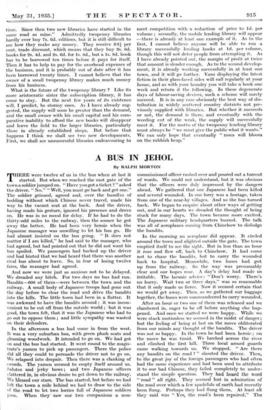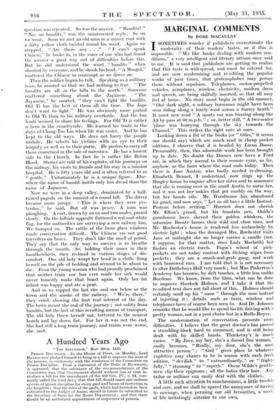A BUS IN JEHOL
By RALPH MORTON
THERE were twelve of us in the bus when at last it started. But when we reached the east gate of the town a soldier jumped on. " Have you got a ticket ? " asked the driver. " No." " Well, you must go back and get one." The soldier grinned, agreed and, over the bundles of bedding without which Chinese never travel, made his way to the vacant seat at the back. And the driver, having made his gesture, ignored his presence and drove on. He was in no mood for delay. If he had to do the thirty-odd miles to the railway, then the sooner he got away the better. He had been very heroic when the Japanese manager was unwilling to let his bus go. He had almost insisted on the bus going. " It does not matter if I am killed," he had said to the manager, who had agreed, but had pointed out that he did not want his bus spoiled. We passengers had backed up the driver and had hinted that we had heard that there was another rival bus about to leave. So, in fear of losing twelve fares, the manager had agreed.
And now we were just as anxious not to be delayed. We dreaded any hitch. For two days no bus had run. Bandits-600 of them—were between the town and the railway. A small body of Japanese troops had gone out the day before to clear the road and drive the bandits into the hills. The little town had been in a flutter. It was awkward to have the bandits around ; it was incon- venient to be cut off from the outside world ; • but it was good, the town felt, that it was the Japanese who had to go out to oppose them ; and little sympathy was wasted on their defenders.
In the afternoon a bus had come in from the west. It was a very suburban bus, with green plush seats and gleaming woodwork. It intended to go on. We had got on and-the bus had started. It went round to the magis- trate's yamen to pick up passengers. There the police did all they. could to persuade the driver not to go on. We relapsed into despair. Then there was a clanking of swords. The yamen seemed to empty itself around us. Salutes and jerky bows ; and two Japanese officers clattered in, in obvious desire to get down to the railway. We blessed our stars. The bus started, but before we had left the -town a mile behind we had to draw to the side of the road to let two lorries full of Japanese soldiers pass. When they- -saw our two companions a non- commissioned officer rushed over and poured out a torrent of words. We could not understand, but it was obvious that the officers were duly impressed by the dangers ahead. We gathered that one Japanese had been killed and several wounded. In one lorry was a hostage, taken from one of the near-by villages. And so the bus turned back. We began to enquire about other ways of getting out, and in our hearts we dreaded the thought of being stuck for many days. The town became more excited. The Japanese military headquarters buzzed. The talk was all of aeroplanes coming from Chinchow to dislodge the bandits.
In the morning an aeroplane did appear. It circled around the town and alighted outside the gate. The town emptied itself to see the sight. But in less than an hour it rose and flew off, back to Chinehow. It had come not to chase the bandits, but to carry the wounded back to hospital. Meanwhile, two buses had got up from the railway. So the way was presumably clear and our hopes rose. A day's delay had made us irritable. The laconic advice : "Don't worry. There's no hurry. Wait two or three days," was so reasonable that it only made us fierce. Now it seemed certain that we would get away. Then, as we gathered our baggage together, the buses were commandeered to carry wounded.
After an hour or two one of them was released and we clambered in, eager to be off before anything else hap- pened. And once we started we were happy. While we were stuck motionless we seemed in the midst of danger; but the feeling of being at last on the move obliterated from our minds any thought of the bandits. The driver was not so happy. In the town he had been heroic ; on the move he was timid. We lurched across the river and climbed the first hill. Three local armed guards came walking towards us. We stopped. " Are there any bandits on the road ? " shouted the driver. Then, to the great joy of the foreign passengers who had often had the same experience and had been used to attribute it to our bad Chinese, they failed completely to under- stand the simple question. They had heard the word " road " all right. They seemed lost in admiration of the road over which a few spadefuls of earth had recently been flung. Perhaps they had flung them. At least all they said was " Yes, the road's been repaired." The question was repeated. So was the answer. " Bandits? " " No, no bandits," was the uninterested reply. So on we went. Soon we met an old man in a mauve coat with a dirty yellow cloth twisted round his waist. Again we stopped. " Are there any . . ." " I can't speak Chinese," he broke in, in the voice of one who had found, the answer a good way out of difficulties before this. But he did understand the word " bandits " when shouted by everyone, and he shook his head. " A Mongol," muttered the Chinese in contempt as we drove on.
Then the soldier began to talk. Speaking as a military man, he assured us that we had nothing to fear. " The bandits are all in the hills to the north." Someone muttered something about the Japanese. " The Japanese," he snorted, " they can't fight the bandits. Old Ti has the best of them all the time. The Japs don't want to fight." He was obviously more partial to Old Ti than to his military. overlords. And the bus loads seemed to share his feelings.. For Old Ti is rather a. hero .in the countryside. He learned his trade in the days of Chang-Tso Lin when life was easier.. And he has kept to the old ways. He does not harry the people unduly. He selects his victims with an eye to their iniquity as well as to their purse. He prefers to carry off those concerned in the sale of narcotics. He has a lenient side to the Church. In fact he is rather like Robin Hood. Stories are told of his exploits, of.his journeys on the railway, his visits to friends and his stay in a mission hospital. He is fifty years old and is often referred to as -" gentle." Unfortunately he is a unique figure. ' Else- where the name of bandit instils only less dread than the name of Japanese: Now we were in a deep valley, dominated by a half- ruined pagoda on the summit of is round hill. The driver became more jumpy. .” This ,is where they were yes- terday," he said. But all was peace. A man was ploughing. A cart, drawn by an ox and two mules, passed slowly. On the hillside opposite fluttered a red-and-white flag, for the authorities are surveying a new railway line. We bumped on. The rattle of the loose -glass windows made conversation difficult. The Chinese are not good travellers on buses. They don't like the smell of petrol. They say that the only way to survive is to breathe through the mouth. So, holding their noses in their handkerchiefs, they reclined in various stages of dis- comfort. One old lady wrapt her head in a cloth, flung herself on the pile of bedding and seemed to be about to die. Even the young woman who had proudly proclaimed that neither train nor bus ever made her sick would never honestly make that boast again. . Only her -fat infant was happy and ate a pear. . . And• so we topped the last rise and saw below us the town and the smoke of the railway. We're there," they cried, showing the first real interest of the day. The town meant the end of the journey ; not safety from bandits, but the last of this revolting means of transport. The old lady threw herself out, tottered to the nearest bench and lay down flat. For her it was not the end. She had still a long train journey, and trains were worse, she said.



























































 Previous page
Previous page